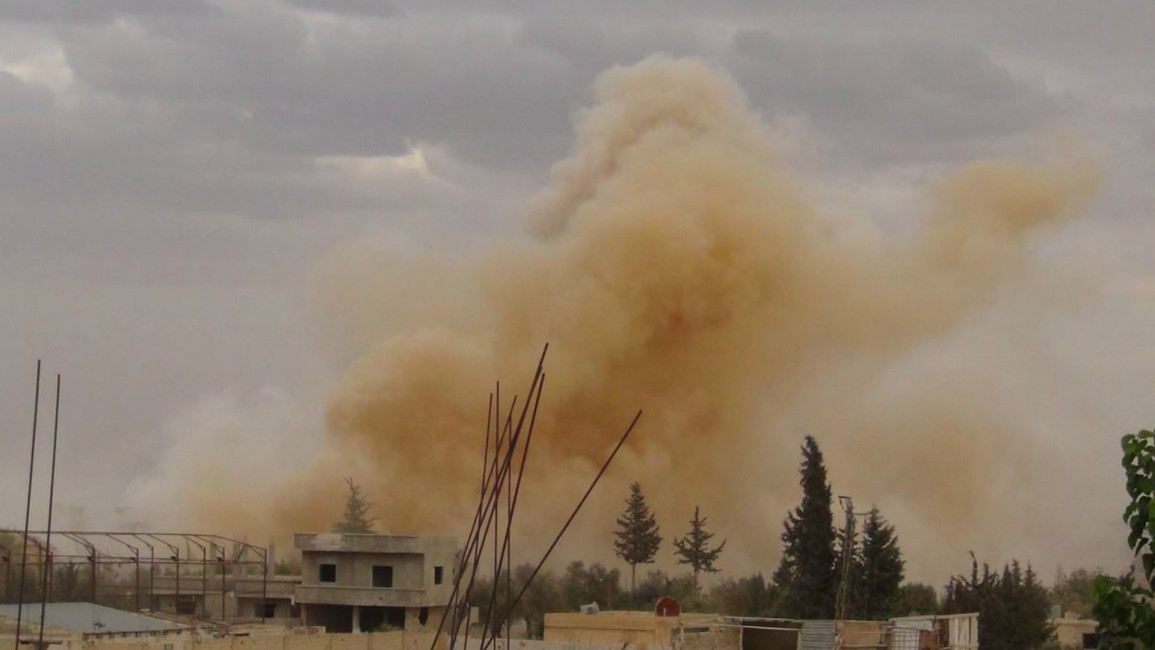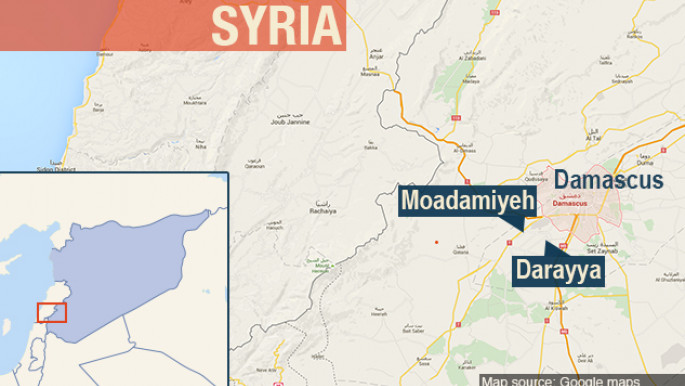
Diary from Moadamiyeh, a besieged Damascus suburb
Diary from Moadamiyeh, a besieged Damascus suburb
Barrel bombs, militia attacks and sacrifice: A day in the life of Dani Qappani, a Syrian activist in the besieged Damascus suburb of Moadamiyeh.
4 min read
Moadamiyeh is a Free Syrian Army stronghold in a Damascus suburb.
The surrounding areas are regime-held and government forces have been beseiging the city for five years.
Medicine, aid, food and even money cannot come through into the area.
Moadamiyeh is also frequently subjected to barrel bomb attacks and sniper fire. It was hit by a chemical attack in 2013.
Although the city came under a 'truce' with the Syrian regime last year, attacks on the suburb and the seige on its inhabitants continue. Militant opposition groups have a negligible presence in the area.
The surrounding areas are regime-held and government forces have been beseiging the city for five years.
Medicine, aid, food and even money cannot come through into the area.
Moadamiyeh is also frequently subjected to barrel bomb attacks and sniper fire. It was hit by a chemical attack in 2013.
Although the city came under a 'truce' with the Syrian regime last year, attacks on the suburb and the seige on its inhabitants continue. Militant opposition groups have a negligible presence in the area.
"I woke up terrified. My nephews were crying because they were scared.
Two barrel bombs were dropped near our house.
The house near us had burned down and we could see that the family were injured. I tried to calm my nephews, but my efforts were in vain.
I got dressed and picked up my camera. My mother asked me where I am going and I replied with only two words: "Duty calls".
I heard nothing from her but "please take care".
I left heading to the battlefront where [Bashar al-]Assad militias have been trying to take over the suburb for three weeks, in a desperate attempt to try and separate my city, Moadamiyeh, from Darayya – another liberated and besieged area.
Dispatches from the front
I reached the area of the fighting and it was dangerous. We were targeted with artillery shells from the Syrian army's Fourth Division; missiles, mortars and barrel bombs. Many of my friends were injured.
We ran to evacuate the injured, but the Assad militias aimed at us with a missile. A young man died immediately and the others were injured.
I felt like my end had come. I remembered my mother's last words and that is what gave me strength to stand up on my feet. We finally made it out of the area of the clashes.
After returning from the battlefront, I watched some children playing football.
Even though they were at danger of bullets, missiles and barrel bombs, they didn't care - they were just laughing and playing.
My phone rang. It was my mother. I tried to answer the call but couldn't because network was bad as usual.
Two barrel bombs were dropped near our house.
The house near us had burned down and we could see that the family were injured. I tried to calm my nephews, but my efforts were in vain.
I got dressed and picked up my camera. My mother asked me where I am going and I replied with only two words: "Duty calls".
I heard nothing from her but "please take care".
I left heading to the battlefront where [Bashar al-]Assad militias have been trying to take over the suburb for three weeks, in a desperate attempt to try and separate my city, Moadamiyeh, from Darayya – another liberated and besieged area.
Dispatches from the front
I reached the area of the fighting and it was dangerous. We were targeted with artillery shells from the Syrian army's Fourth Division; missiles, mortars and barrel bombs. Many of my friends were injured.
We ran to evacuate the injured, but the Assad militias aimed at us with a missile. A young man died immediately and the others were injured.
I felt like my end had come. I remembered my mother's last words and that is what gave me strength to stand up on my feet. We finally made it out of the area of the clashes.
After returning from the battlefront, I watched some children playing football.
Even though they were at danger of bullets, missiles and barrel bombs, they didn't care - they were just laughing and playing.
My phone rang. It was my mother. I tried to answer the call but couldn't because network was bad as usual.
I sat away from all my friends because I wanted to have some privacy. Many visions came into my mind simultaneously when I saw the barrel bombs fall.
I asked myself, "Why is this happening to us? Is one word - 'freedom' - able to make the entire world mad at us? Is there anybody listening to our crying? Will there be peace again in Syria?"
Back home
Actually I had no answer to my questions because I know deep down inside that the world has been busy with IS [the Islamic State group] and with legislating Assad's massacres against us Syrians.
I stood up tired and sad after seeing more blood and more terrified innocent children and women.
I went with my friends to visit the injured civilians in the field hospital then headed to the office to upload videos and share photos we had taken in case there would be anyone who listens and is moved to change our present tragedy. After that, I went home.
All I wanted to do was to hug my mother and nephews, I really did.
She cried the moment she saw me because she didn't want to lose another son. I lost my youngest brother when he was detained three years ago.
All my family was sitting in darkness all around a stove. They were putting plastic, papers and old clothes on the fire to make the children warm.
The room was full of smoke, but what to do? Die from suffocation, or from the shelling, or the freezing weather?
I didn't change my clothes because I was exhausted and hungry. I ate some olives, had soup then went to bed and covered myself with a blanket.
I closed my eyes for two minutes. Everything that happened during the day came back to me as if I was watching a movie; a horror movie.
My friends, would you excuse me? Because I can't finish what I am writing… I can't stop crying.
It was a day full of shelling, death, blood, hunger, darkness, thirst, cold weather, and lost children's innocence.
All of us in Moadamiyeh are used to this and face this reality every day… but still… what a sad day."




